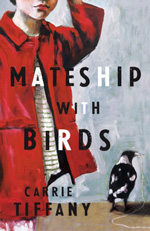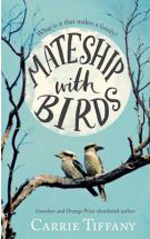

Pan MacMillan Australia, paperback, 9781742610764

Picador (UK), hardcover, 9781447219866
MATESHIP WITH BIRDS
Reviewed by Judy Lim
In 1922 Alec Chisholm, a bird lover and naturalist, wrote about the birds he watched and called his book Mateship with Birds. His book is delightfully easy to read, humorous and insightful.
In 2012 Carrie Tiffany, a former park ranger and currently an agricultural journalist, has written an equally delightful book whose title she has taken from Chisholm's work. In Tiffany's version however, she writes primarily about a small group of people living near the township of Cohuna in an isolated farming district in northern Victoria, Australia, in the early 1950s.
Harry is a dairy farmer who has lost his wife to the charms of a local bird watcher. He has no children and lives alone, with a pile of women's journals, his routines and his thoughts, which often turn to the young family living next door. Betty is a single mother who works at the nursing home in town. She has two children: Michael, a young teenager, who goes to school, helps around the farm and thinks a lot about girls; and little Hazel who has never known her father yet has always known Harry.
Betty is a lonely woman, but she "gets on with the day for there is nothing else to be done with it." She is a pragmatic person who tends to her charges at the nursing home with love and respect. She yearns for love, perhaps even for some romance, but being the humble woman she is, does not imagine that she will ever be fortunate enough to be desired by another man.
Mateship with Birds is a book about observation, about observing the world through its seasons, its landscape and through nature. Although Harry observes all aspects of nature, he has a special affinity for the birds on his property. He watches a family of kookaburras, wondering at their ability to be both loving and cruel yet still remain a family, and causing Harry to speculate about how his own family compared to that of the kookaburras.
Even the farm is almost a character in this sparse and unsentimental story with an undercurrent of desire and love. Every aspect of birth, life, death and decay as seen on the farm by Harry and the children is discussed or at least mentioned in Tiffany's uncompromising style. However, when Harry, in his usual earnest way, attempts to aid Michael in his transition from boy to man by writing letters discussing sex, he finds himself in trouble. He has neglected to talk to Betty about what he is doing and she is not happy.
Mateship with Birds is a quiet book. It includes passages of field notes and journal entries which read at times like a scrapbook or ledger of the life Harry, Betty and the children have on the land. The language is practical, even sometimes hard and pragmatic. Yet through Tiffany's ability to compare and contrast the landscape and nature to her characters, it remains tender, sensitive and intimate. Tiffany's elegant prose has produced a quirky book which is endearing, surprising and charmingly readable.
